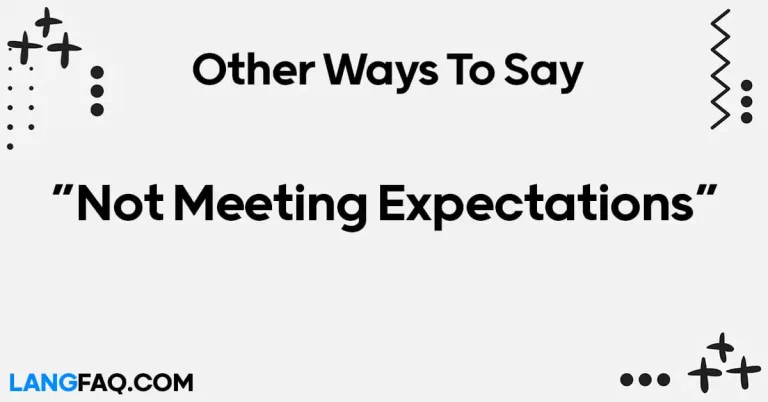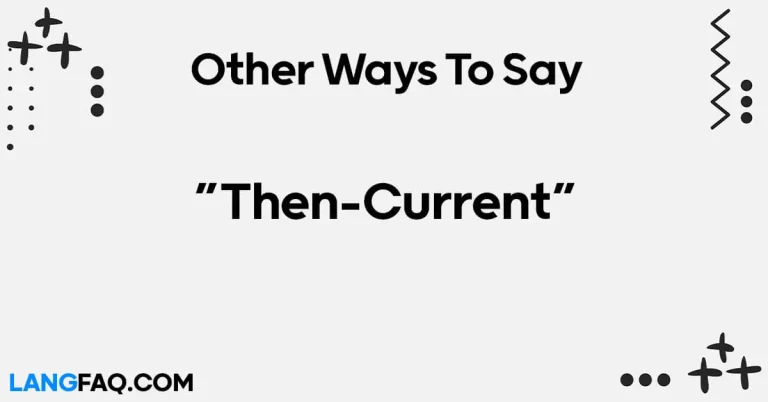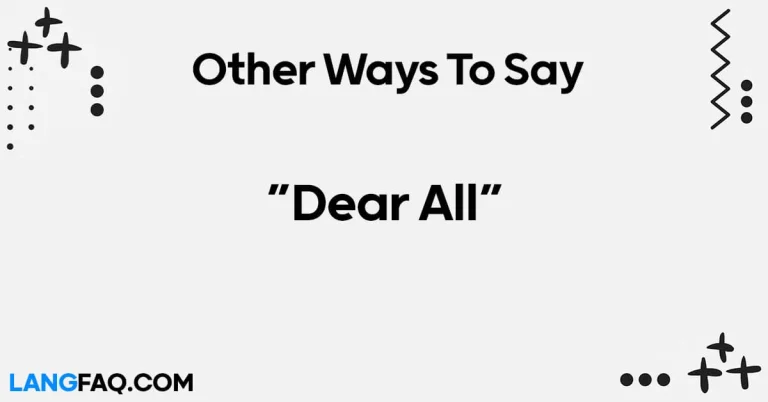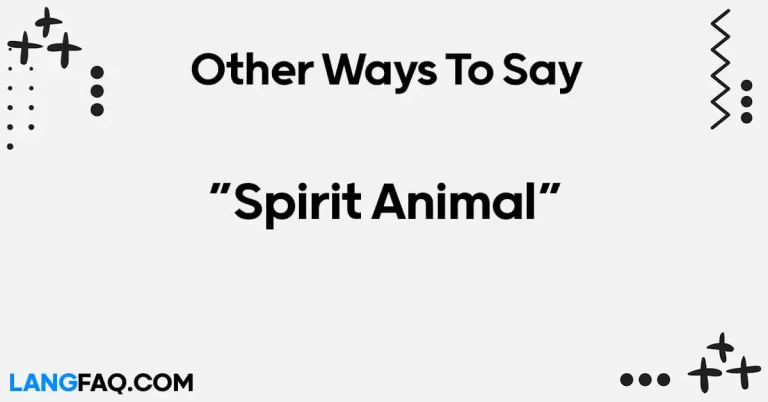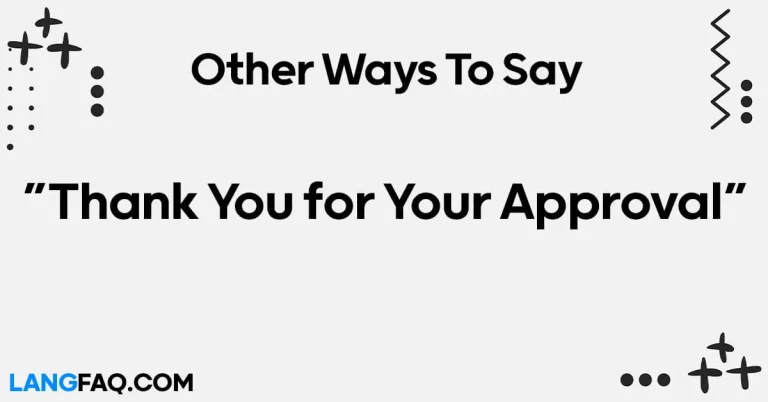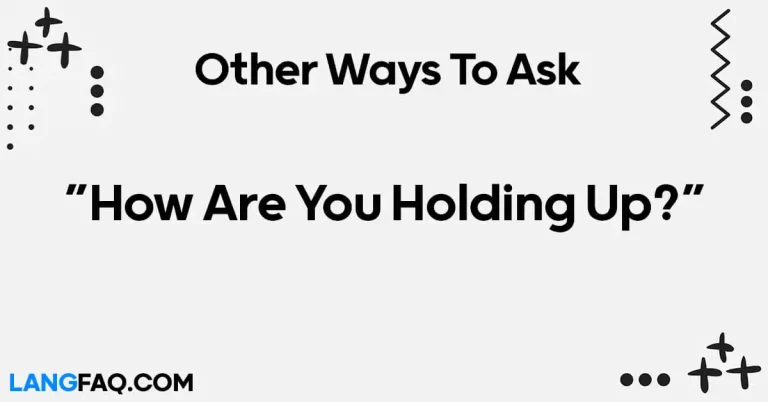In the dynamic realm of professional interactions, the way we refer to our past colleagues can significantly impact our communication style. Understanding various expressions beyond the generic “former colleague” not only adds diversity to our language but also reflects a nuanced understanding of workplace relationships. Let’s delve into 12 distinctive ways to say “former colleague” and enhance your workplace vocabulary.
12 Other Ways to Say “Former Colleague”
Here are 12 alternative ways to say “Former Colleague”:
- Past Workmate
- Previous Collaborator
- Ex-Professional Associate
- Erstwhile Co-worker
- Antecedent Colleague
- Workmate of the Past
- Prior Team Contributor
- Former Work Comrade
- Networking Ally
- Industry Compatriot
- Past Desk Buddy
- Virtual Collaborator
Here’s a table with meanings and examples for the 12 Other Ways to Say “Former Colleague”:
| Term | Meaning | Example |
|---|---|---|
| Past Workmate | Former colleague from a shared workplace | “I recently caught up with a past workmate.” |
| Previous Collaborator | Someone with whom you’ve worked in the past | “Sarah, my previous collaborator, is now leading a new project.” |
| Ex-Professional Associate | Former professional connection | “John, an ex-professional associate, recommended me for the role.” |
| Erstwhile Co-worker | A former colleague in a previous job or role | “An erstwhile co-worker shared insights about the industry.” |
| Antecedent Colleague | Colleague from a previous time or position | “Mary, an antecedent colleague, offered valuable advice.” |
| Workmate of the Past | Someone you worked with in a previous period | “I cherish the memories with my workmate of the past.” |
| Prior Team Contributor | Former team member or collaborator | “Alex, a prior team contributor, played a key role in project success.” |
| Former Work Comrade | Past colleague with whom you shared tasks | “Reflecting on my career, I remember my former work comrade, Jake.” |
| Networking Ally | Former colleague with whom you maintain a connection | “Rebecca, a networking ally, introduced me to valuable contacts.” |
| Industry Compatriot | Colleague from the same industry or field | “Emily, an industry compatriot, understands the challenges we face.” |
| Past Desk Buddy | Former colleague who shared a workspace | “Mike, my past desk buddy, was always great to work alongside.” |
| Virtual Collaborator | Former colleague in online or remote collaboration | “As a virtual collaborator, James contributed to our digital initiatives.” |
Expanding your vocabulary to describe former colleagues not only adds richness to your communication but also allows you to tailor your language to different professional contexts. These alternatives offer varied expressions, allowing you to convey the nuances of your past working relationships with precision and flair.
Is It Correct to Say “Former Colleague”?
Absolutely, saying “Former Colleague” is entirely correct and widely used in professional communication. This phrase is straightforward, neutral, and universally understood, making it suitable for various contexts. Whether in emails, conversations, or formal documents, “Former Colleague” effectively communicates that the person being referred to was once a coworker but is no longer in the same workplace.
When to Use “Former Colleague”:
- Professional Emails:
- Example: “Dear [Recipient], I wanted to connect regarding a mutual project we worked on when you were a former colleague at [Company].”
- Networking Events:
- Example: “At networking events, it’s common to introduce yourself by mentioning your current role and a bit about your experience, including past positions as a former colleague.”
- LinkedIn Connections:
- Example: “Connecting with former colleagues on LinkedIn is a great way to stay in touch and expand your professional network.”
- Resume or CV:
- Example: “Under the ‘Work Experience’ section, you might list your previous positions with the heading ‘Former Colleague’ followed by the relevant details.”
Variations and Considerations:
While “Former Colleague” is perfectly acceptable, there may be situations where you want to add a touch of variety or emphasize different aspects of the past working relationship. In such cases, the alternatives provided earlier, such as “Past Workmate” or “Previous Collaborator,” can offer nuanced options.
Professional Mail Example With “Former Colleague”
Subject: Reconnecting for Potential Collaborations
Dear [Recipient’s Name],
I trust this email finds you well. My name is [Your Name], and I had the pleasure of working with you at [Former Company] a few years ago. As a former colleague, I recall the positive impact your expertise had on our projects, and I hope this message brings back some fond professional memories.
I am reaching out with the intention of reconnecting and exploring potential collaborations. Since our time as former colleagues, I have ventured into [Brief Overview of Current Role or Projects], and I believe there could be valuable synergies between our current endeavors.
I would appreciate the opportunity to discuss this further, whether through a virtual meeting or a coffee catch-up if you find it convenient. Your insights were always valuable, and I believe our shared experience as former colleagues could pave the way for meaningful collaboration.
Please let me know a time that suits you, and we can coordinate accordingly. I am confident that, as former colleagues, our combined expertise can lead to mutually beneficial outcomes.
Looking forward to the possibility of reconnecting and exploring avenues for collaboration.
Best regards,
[Your Full Name] [Your Position] [Your Contact Information]
1. Past Workmate: Navigating Shared Workspaces
In the realm of professional relationships, the term “Past Workmate” holds a certain warmth. This expression is versatile, fitting both formal and informal contexts. Use it when reminiscing about shared projects, fostering camaraderie.
Example Sentence: In a recent meeting, I caught up with a past workmate, and we reminisced about the challenges we overcame together.
Variations:
- Colleague Context: “My esteemed past workmate, Mr. Johnson, contributed significantly to our team’s success.”
- Friendship Context: “Tom, my past workmate and now friend, always makes the workplace enjoyable.”
- Mentor-Mentee Context: “As my past workmate and mentor, Sarah guided me through the intricacies of the project.”
Email Sample:
Subject: Catching Up with a Past Workmate
Dear [Recipient],
I hope this email finds you well. I recently had the pleasure of reconnecting with a past workmate, and it brought back fond memories of our collaborative efforts. Would you be available for a quick catch-up over coffee next week? I believe it would be a wonderful opportunity to share experiences and discuss potential collaborations.
Best regards, [Your Name]
2. Previous Collaborator: Embracing Shared Endeavors
When you want to emphasize a shared history of projects and accomplishments, “Previous Collaborator” is a powerful term. It’s suitable for professional settings, acknowledging the depth of collaboration.
Example Sentence: Sarah, my previous collaborator, is now leading a new project that builds on our past successes.
Variations:
- Colleague Context: “John, my esteemed previous collaborator, has consistently shown dedication to our shared goals.”
- Friendship Context: “Lisa, my previous collaborator turned friend, always brings creativity to our endeavors.”
- Mentor-Mentee Context: “As my previous collaborator and mentor, Mike’s guidance has been invaluable.”
Email Sample:
Subject: Exciting News from a Previous Collaborator
Dear [Recipient],
I wanted to share exciting news from Sarah, my previous collaborator. She has taken on a new leadership role, and I believe her insights could greatly benefit our upcoming project. Let’s schedule a brief meeting to discuss potential collaborations.
Best regards, [Your Name]
3. Ex-Professional Associate: Elevating Professionalism
For formal situations where maintaining a high level of professionalism is crucial, “Ex-Professional Associate” communicates respect and acknowledges a shared history in the professional realm.
Example Sentence: John, an ex-professional associate, recommended me for the role, showcasing the strength of our professional connection.
Variations:
- Colleague Context: “I had the privilege of working closely with Ms. Thompson, my ex-professional associate, who consistently demonstrated exemplary leadership.”
- Friendship Context: “Sam, an ex-professional associate turned friend, still offers valuable insights into the industry.”
- Mentor-Mentee Context: “As my ex-professional associate and mentor, Richard’s wisdom has been a guiding force.”
Email Sample:
Subject: Endorsement from an Ex-Professional Associate
Dear [Recipient],
I trust this email finds you well. I wanted to inform you that John, an ex-professional associate, has endorsed me for the upcoming project. His confidence in my abilities speaks to our shared history of successful collaborations. I would love to discuss this opportunity further.
Best regards, [Your Name]
4. Erstwhile Co-worker: Adding a Historical Touch
In situations where you want to convey a sense of history, “Erstwhile Co-worker” brings a touch of formality and nostalgia. It’s ideal for reflecting on past experiences in a sophisticated manner.
Example Sentence: An erstwhile co-worker shared valuable insights about the industry, enriching our understanding of its evolution.
Variations:
- Colleague Context: “I recently had the pleasure of reconnecting with Mr. Anderson, my erstwhile co-worker from our days at XYZ Corp.”
- Friendship Context: “Lisa, my erstwhile co-worker turned friend, continues to inspire with her entrepreneurial journey.”
- Mentor-Mentee Context: “As my erstwhile co-worker and mentor, Robert’s guidance has been instrumental in my professional growth.”
Email Sample:
Subject: Insights from an Erstwhile Co-worker
Dear [Recipient],
I trust this email finds you in good health. I recently had the privilege of engaging in a conversation with an erstwhile co-worker, and the insights shared were truly enlightening. I believe these perspectives could positively impact our current projects. Let’s schedule a meeting to discuss further.
Best regards, [Your Name]
5. Antecedent Colleague: Acknowledging a Shared Past
“Antecedent Colleague” emphasizes a shared past, highlighting the historical connection between individuals. It’s a term that can be employed when reminiscing about early professional experiences.
Example Sentence: Mary, an antecedent colleague, offered valuable advice, drawing on her extensive experience in the industry.
Variations:
- Colleague Context: “I had the honor of working alongside Mr. Smith, my antecedent colleague, during the formative years of our careers.”
- Friendship Context: “Sarah, my antecedent colleague turned friend, still provides valuable insights into the industry’s evolution.”
- Mentor-Mentee Context: “As my antecedent colleague and mentor, Richard’s guidance has been a cornerstone of my professional journey.”
Email Sample:
Subject: Guidance from an Antecedent Colleague
Dear [Recipient],
I hope this email finds you well. I recently had the privilege of receiving guidance from Mary, an antecedent colleague. Her wealth of experience and insights proved invaluable. I believe incorporating some of these perspectives could greatly enhance our ongoing projects. Let’s discuss further.
Best regards, [Your Name]
6. Workmate of the Past: Cherishing Shared Memories
In more casual and friendly contexts, “Workmate of the Past” adds a touch of informality. Use it when reminiscing about shared memories and experiences with former colleagues.
Example Sentence: I cherish the memories with my workmate of the past, who always brought positivity to the workplace.
Variations:
- Colleague Context: “I recently caught up with Mr. Johnson, my esteemed workmate of the past, and it brought back memories of our collaborative projects.”
- Friendship Context: “Tom, my workmate of the past turned friend, has a knack for turning challenges into opportunities.”
- Mentor-Mentee Context: “As my workmate of the past and mentor, Sarah’s guidance has been a constant source of inspiration.”
Email Sample:
Subject: Reconnecting with a Workmate of the Past
Dear [Recipient],
I trust this email finds you well. I recently had the pleasure of reconnecting with a workmate of the past, and it brought back cherished memories of our shared projects. I believe our historical connection could pave the way for exciting collaborations. Let’s catch up soon.
Best regards, [Your Name]
7. Prior Team Contributor: Recognizing Team Efforts
When you want to emphasize someone’s role in a team, “Prior Team Contributor” is a fitting term. It acknowledges their contribution to collective success and highlights teamwork.
Example Sentence: Alex, a prior team contributor, played a key role in project success, demonstrating exceptional leadership skills.
Variations:
- Colleague Context: “I had the privilege of working closely with Ms. Thompson, my esteemed prior team contributor, who consistently demonstrated exemplary teamwork.”
- Friendship Context: “Lisa, my prior team contributor turned friend, brings a collaborative spirit to every endeavor.”
- Mentor-Mentee Context: “As my prior team contributor and mentor, Mike’s guidance has been instrumental in shaping my teamwork skills.”
Email Sample:
Subject: Acknowledging a Prior Team Contributor
Dear [Recipient],
I hope this message finds you in good spirits. I wanted to take a moment to acknowledge Alex, a prior team contributor, for their exceptional contributions to our past projects. Their teamwork and leadership skills significantly contributed to our success. Let’s explore opportunities for future collaborations.
Best regards, [Your Name]
8. Former Work Comrade: Infusing a Casual Touch
In more relaxed settings, “Former Work Comrade” adds a casual and friendly touch. It’s ideal for informal conversations and brings a sense of camaraderie.
Example Sentence: Reflecting on my career, I remember my former work comrade, Jake, who always made the workplace enjoyable.
Variations:
- Colleague Context: “I recently caught up with Mr. Anderson, my former work comrade, and it was a delightful trip down memory lane.”
- Friendship Context: “Jake, my former work comrade turned friend, brings a lighthearted vibe to every interaction.”
- Mentor-Mentee Context: “As my former work comrade and mentor, Robert’s guidance has been a blend of professionalism and friendship.”
Email Sample:
Subject: Fond Memories with a Former Work Comrade
Dear [Recipient],
I trust this email finds you well. I’ve been reflecting on my career and couldn’t help but reminisce about my former work comrade, Jake. His positivity and camaraderie always made the workplace enjoyable. Let’s catch up soon and share more memories.
Best regards, [Your Name]
9. Networking Ally: Emphasizing Professional Connections
For those focusing on expanding their professional network, “Networking Ally” is a term that implies an ongoing connection beyond the workplace. It’s suitable for formal and networking contexts.
Example Sentence: Rebecca, a networking ally, introduced me to valuable contacts, enriching my professional connections.
Variations:
- Colleague Context: “I recently connected with Ms. Thompson, my esteemed networking ally, who has been instrumental in broadening my professional horizons.”
- Friendship Context: “Rebecca, my networking ally turned friend, always brings valuable insights to our professional discussions.”
- Mentor-Mentee Context: “As my networking ally and mentor, Richard’s guidance has been indispensable in navigating professional networks.”
Email Sample:
Subject: Gratitude for a Networking Ally
Dear [Recipient],
I trust this email finds you thriving. I wanted to express my gratitude to Rebecca, a networking ally, who recently introduced me to valuable contacts. Her support has significantly enriched my professional connections. Let’s explore opportunities for collaboration and further network expansion.
Best regards, [Your Name]
10. Industry Compatriot: Recognizing Shared Industry Background
In specialized industries, “Industry Compatriot” or “Field Associate” resonates well. It emphasizes a shared background in a particular field, making it suitable for professional conversations within that industry.
Example Sentence: Emily, an industry compatriot, understands the challenges we face, bringing valuable insights to our discussions.
Variations:
- Colleague Context: “I recently collaborated with Mr. Smith, my industry compatriot, on a project that required in-depth knowledge of our field.”
- Friendship Context: “Emily, my industry compatriot turned friend, always brings a unique perspective to our industry-related discussions.”
- Mentor-Mentee Context: “As my industry compatriot and mentor, Richard’s guidance has been instrumental in navigating the complexities of our field.”
Email Sample:
Subject: Collaboration Opportunity with an Industry Compatriot
Dear [Recipient],
I hope this email finds you well. I recently had the pleasure of working with Emily, my industry compatriot, on a project that demanded specialized knowledge. Her insights greatly contributed to our success. Let’s explore further collaborations to leverage our shared industry background.
Best regards, [Your Name]
11. Past Desk Buddy: Infusing Informality into Professional Bonds
In scenarios where you want to add an informal touch, “Past Desk Buddy” is a delightful term. It’s perfect for reminiscing about shared workspace experiences and camaraderie.
Example Sentence: Mike, my past desk buddy, was always great to work alongside, making the office atmosphere lively.
Variations:
- Colleague Context: “I recently caught up with Mr. Johnson, my past desk buddy, and we shared a laugh over our office escapades.”
- Friendship Context: “Mike, my past desk buddy turned friend, continues to bring positivity and humor to every interaction.”
- Mentor-Mentee Context: “As my past desk buddy and mentor, Sarah’s guidance has been a blend of professionalism and friendship.”
Email Sample:
Subject: Nostalgia with a Past Desk Buddy
Dear [Recipient],
I trust this email finds you in good spirits. I recently had the pleasure of reconnecting with a past desk buddy, Mike. Our shared memories of office camaraderie brought a smile to my face. Let’s schedule a catch-up soon.
Best regards, [Your Name]
12. Virtual Collaborator: Unveiling the Digital Dimensions of Past Collaboration
In the ever-evolving landscape of remote work and digital collaboration, the term “Virtual Collaborator” emerges as a beacon, illuminating the significance of online partnerships. This phrase seamlessly integrates into our lexicon, capturing the essence of colleagues who were part of the digital tapestry of our professional lives.
When to Use:
- Formal Context: In virtual team meetings or professional correspondence where the emphasis is on digital collaboration.
- Informal Context: During casual conversations highlighting the unique dynamics of remote work friendships.
Example Scenario:
Imagine you’re drafting an email to a former colleague with whom you collaborated extensively online:
Subject: Reflecting on Our Virtual Collaboration
Dear [Colleague’s Name],
As I reflect on our past projects, I am truly grateful for the times we functioned as a dynamic duo in our virtual endeavors. Being a Virtual Collaborator with you brought a new dimension to my understanding of teamwork. Let’s catch up soon to share more stories of our digital collaborations.
Warm regards, [Your Name]
Variations for Different Relationships:
- Between Colleagues: “Digital Workmate” emphasizes the connection forged in the virtual realm.
- Between Friends: Simply refer to them as a “Digital Buddy” to add a friendly touch.
- In a Mentor-Mentee Context: “Guiding Virtual Collaborator” underscores the mentorship in the digital space.
Grammar/Usage Tips:
When incorporating “Virtual Collaborator” into your sentences, be attentive to maintaining a seamless flow. For instance, “As a virtual collaborator, her insights have always been invaluable.”
Pros and Cons:
Pros: Relevant in the era of remote work, adds a contemporary touch to past collaborations. Cons: May not be as universally applicable in traditional workplaces that lack a virtual component.
Conclusion:
In conclusion, diversifying your vocabulary when referring to past colleagues not only adds flair to your language but also showcases adaptability and a nuanced understanding of professional relationships. Embrace these alternatives based on context, and watch your workplace communication reach new heights.
FAQs:
How do I choose the right term for a former colleague?
Selecting the right term depends on the context and your relationship with the person. Consider the formality of the situation and the cultural norms in your industry.
Can I use these terms in a professional email?
Certainly. Using these alternatives in professional emails can add a touch of sophistication to your communication. However, tailor your language based on the recipient and the nature of the email.
Are these terms universally accepted?
While many of these terms are widely accepted, it’s essential to be mindful of cultural differences and workplace norms. Always gauge the appropriateness of the term based on the context.
Do these expressions work in casual conversations?
Absolutely. In more relaxed settings, using casual terms like “past desk buddy” or “former workmate” can foster a friendly atmosphere during casual conversations.
Should I use these alternatives in a job interview?
While some terms, like “previous collaborator” or “ex-professional associate,” might fit well, it’s crucial to assess the formality of the interview setting. Opt for terms that align with the professional tone of the interview.
Can I mix and match these expressions?
Certainly. Language is dynamic, and you can experiment with mixing and matching these expressions based on the fluidity of the conversation. Just ensure that the tone remains appropriate for the context.

